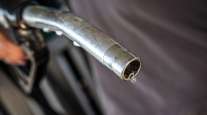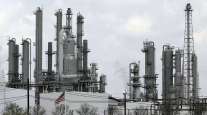Diesel Up 0.2¢ After 6th Weekly Increase
This story appears in the March 4 print edition of Transport Topics.
Retail diesel prices edged up 0.2 cent last week to $4.159 a gallon, reaching the highest level ever recorded in the month of February, according to the Department of Energy.
Diesel prices have now risen six weeks in a row, for a total of 26.5 cents, DOE said after its Feb. 25 survey of fueling stations.
Over the past five years, the diesel average during February has nearly doubled, from $2.13 a gallon on Feb. 23, 2009, to $4.159 on Feb. 25, 2013.
The current price is the highest since Aug. 18, 2008, when a gallon sold for an average of $4.207. At that time, diesel was still falling from its all-time high of $4.764 that July.
However, last week’s gain was by far the smallest during the recent run, and prices could begin to decline soon because crude oil prices are declining, analysts said.
“We’re expecting a pullback in diesel prices in the near term,” said Timothy Hess, an analyst for DOE’s Energy Information Administration. “Right now, we’re thinking of an average of $4.07 a gallon in early March and staying fairly stable in March and April, and a slow easing for the rest of the year to the low $3.80s per gallon range.”
DOE also reported that the retail gasoline average rose 3.7 cents to $3.784 a gallon, the 10th straight weekly increase, but still below its six-month high of $3.878 on Sept. 17.
A year ago, average prices for diesel and gasoline were $4.051 and $3.721, respectively.
Also last week, crude oil prices dropped near $92.50 a barrel on the New York Mercantile Exchange, the lowest since Dec. 31, Bloomberg News reported.
The American Petroleum Institute reported oil inventories gained 904,000 barrels last week to 373.4 million, while domestic production of oil rose to 7.12 million barrels a day in the week ended Feb. 15, the largest gain since August 1992.
“U.S. refinery maintenance typically peaks in February, and we expect that many of the facilities that have recently decreased crude runs should return to normal operations in the coming weeks,” DOE said in a weekly report on petroleum.
Still, Corey England, executive vice president of C.R. England Inc., Salt Lake City, said the effects of rising fuel prices on the U.S. economy are a growing concern for his company.
“The transportation industry has improved its ability to pass along some of the impact of fuel price increases with fuel surcharges,” England said. “This results in a more direct impact on consumers than used to be the case. The last thing we want to see is a negative impact on the already sluggish recovery.”
C.R. England ranks No. 20 on the Transport Topics Top 100 list of the largest for-hire carriers in the United States and Canada.
Similarly, Tom Aumann, vice president of logistics company Evans Transportation Services, based in Brookfield, Wis., said the lack of growth is making it difficult for shippers to counteract rising fuel prices.
“Customers are forced to pass on higher transportation costs to their end-customers, raising the cost of all goods, from toilet paper to heavy machinery,” Aumann said. “As we see fuel prices increase, shipping and consumption will slow.”
Officials at Monarch Beverage, based in Indianapolis, said they expect to cut diesel consumption to less than 100,000 gallons a year from 1 million gallons a year by 2015 by converting trucks to run on compressed natural gas.
The company has been running 27 trucks on CNG since last June and is pleased with the results.
“We ran the trucks hard, on longhaul and regional routes, amassing more than 100,000 miles on each,” said Fred Dufour, senior vice president of operations for Monarch Beverage, which distributes beer and wine.
While the fuel economy for the CNG-powered trucks was 5.7 miles per gallon, compared with 6.2 mpg for the diesel fleet, Dufour said, the lower cost of natural gas means the company is paying the equivalent of $1.50 per gallon for fuel.
The company is also building its own CNG fueling station in Indianapolis and will be able to lock in prices for three years, compared with one year for diesel.
“That gives us great budget certainty,” Dufour said. “What’s more, the vast quantity of domestic natural gas is incredible. I have much more confidence in the price of natural gas staying low than I do diesel.”
By 2015, Monarch Beverage expects to have 90 of 105 trucks in the fleet powered by natural gas, he said.




